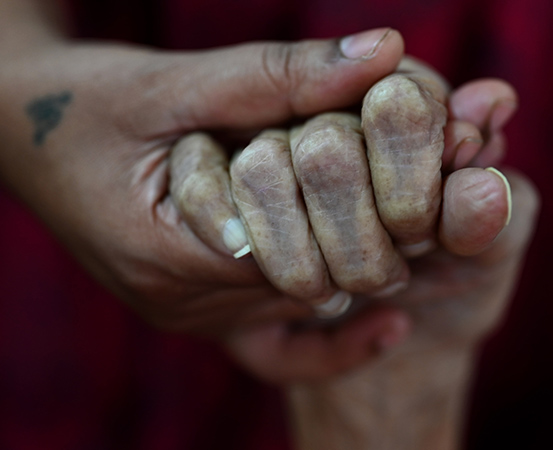
The elderly population is perhaps the most vulnerable when it comes to post-operative care as the body’s immune system is already weak. Advanced age means that they are susceptible to infections and post-surgery complications. At such a difficult time, they must receive the best care possible so that they tide over this phase without complications.
When one is in the hospital, the doctors and nursing staff ensure that the person is taken care of, as per procedure and post-operative care is individualised according to the person’s particular surgery and outcomes. However, it is once they are home that they need to be taken care of more.
When 60-year-old Shamshi Haque, a resident of Guwahati, had a knee surgery last year, she was initially worried about how she would recover at home post her discharge from the hospital. She knew it was a surgery that would require her to be at home resting, till she walked independently again. It did not help that she lived alone. Her children arrived from the US but had to leave after one month of stay.
READ MORE
Bring pain to its knees
How can seniors deal with weight issues?
All ears for the elderly
Elderly women, give some amour to your health
“I was told I would take around six weeks to recover and maybe, a year before the pain was under control. So I knew I would have to make arrangements at home because it was a very long period of recovery,” says Haque. With a little bit of foresight and previous planning, she managed to get medical help at home in the form of two hospital nurses who came to her aid, for a hefty fee, of course.
But like she says, it was an invaluable service rendered.
Post-operative care: Things to keep in mind
Usually, it is best to prepare for such a scenario beforehand so that the transition from hospital to home is a smooth one and all medical emergencies or complications can be prevented or taken care of, promptly.
It is important to make a few changes in the home of the elderly after a surgery, for example, rearranging furniture or installing medical equipment for home care.
“Rehabilitation from any kind of surgery to improve the functionality is making proper adjustments in the home surroundings, good nutrition, motivation and the prevention of infectious disease. Also, one must restrict visitors as they can be a source of infection; proper care of the wound has to be taken, and if diabetic, sugar has to be under control,” says Dr Mahesh Chikkachannappa, senior consultant, surgery, Aster CMI Hospital, Bengaluru.
Also, one thing to remember is that most elderly patients are susceptible to delirium. It is often an undiagnosed complication in them following a major operation.
So, planning post the operation is not a good idea. Always prepare before, say doctors.
Check with your doctor
After an operation, hospitals provide a record of medication administered and to be followed up in the coming days.
One could get in touch with medical/nursing agencies that provide specialised services at home. Dr Aarthi Kannan, consultant geriatrician, Apollo Hospitals, Bengaluru, says, “senior citizens may encounter many issues post their surgery. They have a higher susceptibility to post-operative cardiac complications, fluid overload, adverse effects of medications, delirium, bleeding and infection in the immediate postoperative period.”
These risks are even more pronounced if there are co-existing chronic medical conditions such as heart, lung or kidney ailments, cancer, diabetes or suppressed immunity. In the subsequent weeks following surgery, infections, hospital-acquired infection, decline or loss of function and independence, issues with rehabilitation/problems regaining strength and function, multiple prescription medications and medication interactions are all significant concerns in older patients.”
Therefore, it is necessary to ask doctors every detail about the surgery and related complications, side effects and post-operative care and if one needs a physiotherapist to come home till recovery.
“A professional set-up should incorporate evidence-based best practices in patient care. There should be coordinated interdisciplinary teamwork involving physician and non-physician healthcare providers. Short-term restorative and rehabilitative programmes after the discharge of the elderly should be there to monitor them outside the hospital and help them with appropriate and adequate rehabilitation. Involving a geriatrician post-discharge in the rehabilitative period addresses several of these issues for the elderly,” adds Dr Kannan.

















